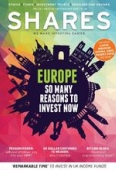Archived article
Please note that tax, investment, pension and ISA rules can change and the information and any views contained in this article may now be inaccurate.
Unicorn UK Growth Fund is a magical money-maker

While the growth outlook for Britain is somewhat uncertain, many small companies with good positions in structurally-growing markets should still be able to deliver increases in sales, profit and crucially, the cash flows that drive share price performance over time.
One fund plugged into this part of the market is Unicorn UK Growth Fund (GB0031269250), a multi-cap collective aiming to achieve long-term capital growth through investment in a portfolio of UK equities, but with a bias towards smaller companies listed on AIM.
Managed by Unicorn Asset Management’s Fraser Mackersie since February 2011, Unicorn UK Growth has a concentrated portfolio allocating capital across all sectors of the market.
Over the last five years, the fund has returned 120.8% versus the 60.7% generated by the IA UK All Companies sector, according to data from FE Trustnet, and has been ranked consistently in the sector’s first quartile of performers.
STRONG END-MARKETS
‘We keep things pretty simple on the growth fund,’ says Mackersie, who seeks out profitable, cash generative and typically dividend paying companies for the near-£50m portfolio.
‘There’s no blue sky, pre-revenue or very speculative stocks held within Unicorn UK Growth,’ he stresses.
‘Across the board at Unicorn, we do meet lots of companies. We’re looking for a strong end-market and a company with a strong position in that end-market.’
Mackersie says the team behind the fund are generalists, although they’ve been drawn to software and computer services over the last seven years as one of the sectors which offered good value. The fund does not invest in oil, gas, mining, pharma or biotech stocks.
Of the 50 names currently nestling in the portfolio, 10 were acquired when they floated on the stock market.
PLAYING CERTAIN THEMES
Technology is a clear theme in the portfolio, with software and computer services speaking for 21.8% of assets at last count, although Mackersie stresses that he doesn’t like to be too narrow.
‘The growth in online retail and the growth in the broader digital economy in the UK are themes we can play through a variety of other sectors.’
To illustrate, he cites portfolio holdings Clipper Logistics (CLG), the high-growth logistics solutions-to-e-fulfilment company whose customers include ASOS (ASC:AIM), as well as retail assets-owning REIT LondonMetric Property (LMP). In November 2017, Mackersie also initiated a position in packaging group DS Smith (SMDS), which is benefiting from e-commerce demand.
EXPOSURE BEYOND THE UK
One portfolio holding in good shape is US-based and UK-listed Somero Enterprises (SOM:AIM). Its shares recently strengthened in value after it said 2017 revenue would beat market expectations and that it would benefit from a lower corporate tax rate in the US.
‘Somero provides machines that lay concrete to a high specification level of flatness,’ enthuses Mackersie, arguing Somero is a beneficiary of construction growth in the US and globally.
CRYSTALISING GAINS
‘We’ll take profit in things that have done particularly well,’ says Mackersie, who gives the example of selling a bit of the fund’s holding last year in Frontier Developments (FDEV:AIM).
Despite reducing the fund’s stake, he continues to believe the long-term outlook for Frontier is strong. Backed by Chinese internet giant Tencent, the video games developer has had success with its Elite Dangerous and Planet Coaster games and its third franchise, Jurassic World Evolution, is on track for launch this summer.
LOSING STOCKS TO TAKEOVERS
While Unicorn UK Growth’s intended investment horizon is three to five years (and hopefully longer), the fund is currently below that range, in part due to heightened M&A activity.
Mackersie explains that if he got something right, the holding period will be longer. ‘We’ve also had a lot of M&A activity in the 18 months since the Brexit vote which has contributed to our current average holding period falling below our expected long term range.’
The qualities of the firms in the portfolio, ‘good companies in strong end markets with an IP or channel to market hard to replicate’, means they are often highly prized by bidders.
Portfolio holdings that have been taken over in relatively recent memory include ARM (bought by Japan’s SoftBank), UK Mail (Deutsche Post DHL) and IP-rich E2V Technologies, bought by Teledyne last year, while more recently, Servelec has been taken over by European private equity firm Montagu. (JC)
Important information:
These articles are provided by Shares magazine which is published by AJ Bell Media, a part of AJ Bell. Shares is not written by AJ Bell.
Shares is provided for your general information and use and is not a personal recommendation to invest. It is not intended to be relied upon by you in making or not making any investment decisions. The investments referred to in these articles will not be suitable for all investors. If in doubt please seek appropriate independent financial advice.
Investors acting on the information in these articles do so at their own risk and AJ Bell Media and its staff do not accept liability for losses suffered by investors as a result of their investment decisions.

 magazine
magazine











